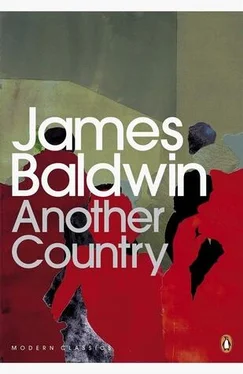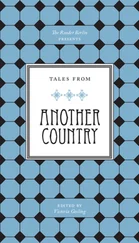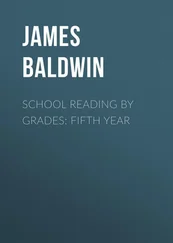They started into the house, with their arms around each other.
“Try to get Madame Belet to come and cook something for us.”
“What do you want to eat?”
“I don’t care. Whatever you want.”
The house was long and low, built of stone, and very cool and dark after the heat and brightness of the kitchen. The kitten had followed them in and now murmured insistently at their feet.
“Perhaps I will feed her before I go. It will only take a minute.”
“She can’t be hungry yet, she eats all the time,” said Eric. But Yves had already begun preparing the kitten’s food.
They had entered through the kitchen and Eric walked through it and through the dining salon, into their bedroom, and threw himself down on the bed. The bedroom also had an entrance on the garden. The mimosas pressed against the window, and beyond these were two or three orange trees, holding hard, small oranges, like Christmas balls. There were olive trees in the garden, too, but they had been long untended; it was not worth anyone’s while to pick the olives.
The script of the new play was on the plain wooden table which, along with the fireplace in the dining room, had persuaded them to rent the house; on the table, too, were a few books, Yves’ copies of Blaise Cendrars and Jean Genet and Marcel Proust, Eric’s copies of An Actor Prepares and The Wings of the Dove and Native Son . Yves’ sketch pad was on the the floor. So were his tennis shoes and his socks and his underwear, all of these embracing Eric’s sport shirts and sandals and bathing trunks — less explicit and more somber than Yves’ bikini, these last, as Eric himself was less explicit and more sombre.
Yves clattered into the bedroom.
“Are you going to take that shower or not?”
“Yes. Right away.”
“Well, start. I am leaving now, I will be back in a moment.”
“I know your moments. Try not to get too drunk with the natives.” He grinned and stood up.
Yves picked up a pair of socks from the floor, put them on, and put on his tennis shoes, and a faded blue pullover. “Ah. Celui-tàje to jure .” He took a comb from his pocket and pulled it through his hair, with the result that it stood up more wildly than ever.
“I’ll put you on your bicycle.”
They walked past the mimosas. “Hurry back,” said Eric; smiling, staring at Yves.
Yves picked up his bicycle. “I will be back before you are dry.” He rolled the bicycle through the gate and onto the road. Eric stood in the garden, watching him. The light was still very bright but, in the mysterious way of southern light, was gathering itself together and would soon be gone. Already, the sea looked darker.
Once past the gate, Yves did not look back. Eric turned into the house.
He stepped into the shower, which was off the bedroom. He fumbled with the knobs, and the water came crashing over him, first too cold, but he forced himself to take it, then too hot; he fumbled with the knobs until the water became more bearable. He soaped himself, wondering if he were really getting fat. His belly seemed firm enough, but he had always had a tendency to be chunky and square; it was just as well that he would soon, in New York, be going again to the gym. And the thought of the gym, while the water fell down over him, he was alone with his body and the water, caused many painful and buried things to stir in him. Now that his flight was so rigorously approaching its end, a light appeared, a backward light, throwing his terrors into relief.
And what were these terrors? They were buried beneath the impossible language of the time, lived underground where nearly all of the time’s true feeling spitefully and incessantly fermented. Precisely, therefore, to the extent that they were inexpressible, were these terrors mighty; precisely because they lived in the dark were their shapes obscene. And because the taste for obscenity is universal and the appetite for reality rare and hard to cultivate, he had nearly perished in the basement of his private life. Or, more precisely, his fantasies.
These fantasies began as fantasies of love and soured imperceptibly into fantasies of violence and humiliation. When he was little he had been very much alone, for his mother was a civic leader, always busy with clubs and banquets and speeches and proposals and manifestoes, aloft forever on a sea of flowered hats; and his father, rather submerged by this glittering and resounding tide, made his home in the bank and on the golf course, in hunting lodges, and at poker tables. There seemed to be very little between his father and his mother, very little, that is, beyond habit and courtesy and coercion; and perhaps each had loved him, but this was never real to him, since they so clearly did not love each other. He had loved the cook, a black woman named Grace, who fed him and spanked him and scolded and coddled him, and dried the tears which scarcely anyone else in the household ever saw. But, even more than he had loved Grace, he had loved her husband, Henry.
Henry was younger, or seemed younger, than his wife. He was a trial to Grace, and probably to them all, because he drank too much. He was the handyman and one of his duties was the care of the furnace. Eric still remembered the look and the smell of the glaring furnace room, the red shadows from the furnace playing along the walls, and the sticky-sweet smell of Henry’s breath. They had spent many hours together there, Eric on a box at Henry’s knee, Henry with his hand on Eric’s neck or shoulder. His voice fell over Eric like waves of safety. He was full of stories. He told the story of how he had met Grace, and how he had seduced her, and how (as he supposed) he had persuaded her to marry him; told stories of preachers and gamblers in his part of town — they seemed, in his part of town, to have much in common, and, often, to be the same people — how he had outwitted this one and that one, and how, once, he had managed to escape being put on the chain gang. (And he had explained to Eric what a chain gang was.) Once, Eric had walked into the furnace room where Henry sat alone; when he spoke, Henry did not answer; and when he approached him, putting his hand on Henry’s knee, the man’s tears scalded the back of his hand. Eric no longer remembered the cause of Henry’s tears, but he would never forget the wonder with which he then touched Henry’s face, or what the shaking of Henry’s body had caused him to feel. He had thrown himself into Henry’s arms, almost sobbing himself, and yet somehow wise enough to hold his own tears back. He was filled with an unutterably painful rage against whatever it was that had hurt Henry. It was the first time he had felt a man’s arms around him, the first time he had felt the chest and belly of a man; he had been ten or eleven years old. He had been terribly frightened, obscurely and profoundly frightened, but he had not, as the years were to prove, been frightened enough. He knew that what he felt was somehow wrong, and must be kept a secret; but he thought that it was wrong because Henry was a grown man, and colored, and he was a little boy, and white.
Henry and Grace were eventually banished, due to some lapse or offense on Henry’s part. Since Eric’s parents had never approved of those sessions in the furnace room, Eric always suspected this as the reason for Henry’s banishment, which made his opposition to his parents more bitter than ever. In any case, he lived his life far from them, at school by day and before his mirror by night, dressed up in his mother’s old clothes or in whatever colorful scraps he had been able to collect, posturing and, in a whisper, declaiming. He knew that this was wrong, too, though he could not have said why. But by this time he knew that everything he did was wrong in the eyes of his parents, and in the eyes of the world, and that, therefore, everything must be lived in secret.
Читать дальше












